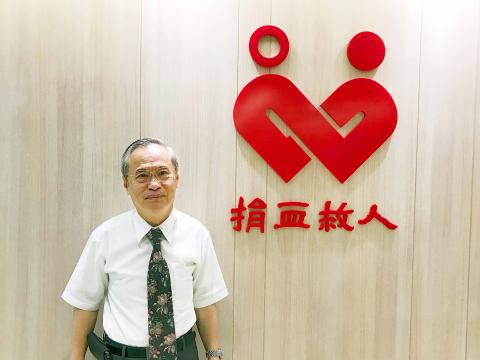The Taiwan Blood Services Foundation is to start before the end of the year a trial run of blood donations from people aged 65 to 70 with an eye to petitioning the government to ease regulations on donor eligibility.
Given an aging population, Taiwan is faced with the dilemma of an ever-increasing demand for blood for transfusions, while its number of eligible young donors declines, the foundation said.
Raising the age limit for donors is an option to boost the nation’s blood supply, foundation chairman Hou Sheng-mao (侯勝茂) said in an article published in the Taiwan Medical Journal.

Photo: CNA
The US, Canada and other nations have been pushing the same measure, as elderly people have the lowest risk for blood-transmitted diseases, he wrote.
As of last year, Taiwan had a blood donation rate of 7.55 percent, which is higher than the average 4 to 5 percent in other countries, the foundation said.
Annual donations reach about 2.5 million bags of 250ml each, with the figure rising steadily, it said.
However, demand is also surging: From 2014 to last year, it rose 4 percent from 2.22 million bags of blood to 2.31 million bags, foundation statistics showed.
Donors were mainly older people, with those aged 41 to 65 contributing 799,000 bags, while donations by younger people, aged 17 to 30, decreased from 629,000 bags to 535,000 bags, the data showed.
Lagging supply leads to a rapid depletion of stored plasma during natural disasters, foundation consultant Lin Tung-tsan (林東燦) said.
Fit and healthy older people have been calling on the government to ease donor restrictions, Lin said.
According to the Food and Drug Administration’s (FDA) Standards for the Health of Blood Donors (捐血者健康標準), people over 65 years old who wish to donate blood must obtain a doctor’s permission and present proof of health.
The trial’s aim is to raise the age cap for donors to 70, with an accompanying clause that they must have donated blood within the past two years without experiencing any discomfort, the foundation said.
It marks the first time in 18 years that the country is discussing whether to relax regulations on donor age, Lin said.
The trial run would impose a maximum donation of 250ml per session, but would allow males to donate up to four times a year — up from three — while platelet donation would remain the same at one unit per session, not fewer than four weeks between sessions and no more than 12 times a year, Lin said.
After a trial run of one to two years, the foundation hopes to present the results and petition the FDA to raise the age limit for donors, it said.
FDA drug division official Huang Mei-chen (黃玫甄) said that the agency would not preclude such discussions.

The High Prosecutors’ Office yesterday withdrew an appeal against the acquittal of a former bank manager 22 years after his death, marking Taiwan’s first instance of prosecutors rendering posthumous justice to a wrongfully convicted defendant. Chu Ching-en (諸慶恩) — formerly a manager at the Taipei branch of BNP Paribas — was in 1999 accused by Weng Mao-chung (翁茂鍾), then-president of Chia Her Industrial Co, of forging a request for a fixed deposit of US$10 million by I-Hwa Industrial Co, a subsidiary of Chia Her, which was used as collateral. Chu was ruled not guilty in the first trial, but was found guilty

DEADLOCK: As the commission is unable to forum a quorum to review license renewal applications, the channel operators are not at fault and can air past their license date The National Communications Commission (NCC) yesterday said that the Public Television Service (PTS) and 36 other television and radio broadcasters could continue airing, despite the commission’s inability to meet a quorum to review their license renewal applications. The licenses of PTS and the other channels are set to expire between this month and June. The National Communications Commission Organization Act (國家通訊傳播委員會組織法) stipulates that the commission must meet the mandated quorum of four to hold a valid meeting. The seven-member commission currently has only three commissioners. “We have informed the channel operators of the progress we have made in reviewing their license renewal applications, and

Taiwan People’s Party (TPP) Chairman Huang Kuo-chang (黃國昌) yesterday appealed to the authorities to release former Taipei mayor Ko Wen-je (柯文哲) from pretrial detention amid conflicting reports about his health. The TPP at a news conference on Thursday said that Ko should be released to a hospital for treatment, adding that he has blood in his urine and had spells of pain and nausea followed by vomiting over the past three months. Hsieh Yen-yau (謝炎堯), a retired professor of internal medicine and Ko’s former teacher, said that Ko’s symptoms aligned with gallstones, kidney inflammation and potentially dangerous heart conditions. Ko, charged with

Taiwan-based publisher Li Yanhe (李延賀) has been sentenced to three years in prison, fined 50,000 yuan (US$6,890) in personal assets and deprived political rights for one year for “inciting secession” in China, China's Taiwan Affairs Office spokesman Chen Binhua (陳斌華) said today. The Shanghai First Intermediate People’s Court announced the verdict on Feb. 17, Chen said. The trial was conducted lawfully, and in an open and fair manner, he said, adding that the verdict has since come into legal effect. The defendant reportedly admitted guilt and would appeal within the statutory appeal period, he said, adding that the defendant and his family have